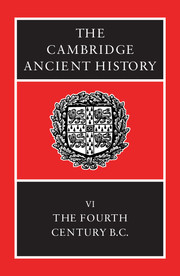Book contents
- Frontmatter
- 1 Sources and their uses
- 2 Sparta as victor
- 3 Persia
- 4 The Corinthian War
- 5 Sicily, 413–368 B.C.
- 6 The King's Peace and the Second Athenian Confederacy
- 7 Thebes in the 360s B.C.
- 8 Regional surveys I: Persian lands and neighbours
- 9 Regional surveys II: the West and North
- 10 Society and economy
- 11 The polis and the alternatives
- 12 Greek culture and science
- 12a The Growth of Schools and the Advance of Knowledge
- 12b Medicine
- 12c Greek art: Classical to Hellenistic
- 12d Greek agriculture in the classical period
- 12e Warfare
- 13 Dion and Timoleon
- 14 Macedon and north-west Greece
- 15 Macedonian hegemony created
- 16 Alexander the Great Part 1: The events of the reign
- 17 Alexander the Great Part 2: Greece and the conquered territories
- 18 Epilogue
- Chronological Table
- BIBLIOGRAPHY
- Index
- Map 1: Greece and Western Asia Minor
- Map 9: Egypt
- Map 20: Alexanders campaigns
- References
12e - Warfare
from 12 - Greek culture and science
Published online by Cambridge University Press: 28 March 2008
- Frontmatter
- 1 Sources and their uses
- 2 Sparta as victor
- 3 Persia
- 4 The Corinthian War
- 5 Sicily, 413–368 B.C.
- 6 The King's Peace and the Second Athenian Confederacy
- 7 Thebes in the 360s B.C.
- 8 Regional surveys I: Persian lands and neighbours
- 9 Regional surveys II: the West and North
- 10 Society and economy
- 11 The polis and the alternatives
- 12 Greek culture and science
- 12a The Growth of Schools and the Advance of Knowledge
- 12b Medicine
- 12c Greek art: Classical to Hellenistic
- 12d Greek agriculture in the classical period
- 12e Warfare
- 13 Dion and Timoleon
- 14 Macedon and north-west Greece
- 15 Macedonian hegemony created
- 16 Alexander the Great Part 1: The events of the reign
- 17 Alexander the Great Part 2: Greece and the conquered territories
- 18 Epilogue
- Chronological Table
- BIBLIOGRAPHY
- Index
- Map 1: Greece and Western Asia Minor
- Map 9: Egypt
- Map 20: Alexanders campaigns
- References
Summary
The fifth century opened with the Persian Wars, which epitomized the superiority over the barbarian of the citizen-soldier, that ideal type which was to flourish in Periclean Athens, the newly dominant city state of Greece. As an institution and in terms of official ideology (as expressed in funeral orations, for example), this ideal was to remain unchallenged until the end of the classical period. In some respects it was even reinforced after the Peloponnesian War by the admission of thetes to the ranks of the hoplites and again, in the time of Lycurgus, by improvement in the military training of epheboi.
In fact, however, the situation was already changing, for although it is true that citizens continued to the last to mobilize without too much reluctance for decisive battles, at other times in the fourth century they were only too ready to entrust their overseas campaigns to mercenaries, to the despair of those who looked back with nostalgia to the days of Athenian greatness and ancestral tradition. The same process was at work, although in varying degrees, in the majority of cities, particularly those, like the Syracuse of Dionysius I and Pherae under Jason, where the power of the tyrant could in this way be increased. It applied even to Sparta, which witnessed a dangerous diminution in the number of its Equals – not to mention the Great King and his western satraps, who were always seeking ‘men of bronze’ to settle their differences for them and to intervene in Mediterranean affairs.
- Type
- Chapter
- Information
- The Cambridge Ancient History , pp. 678 - 692Publisher: Cambridge University PressPrint publication year: 1994
References
- 17
- Cited by

